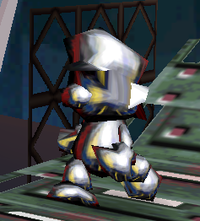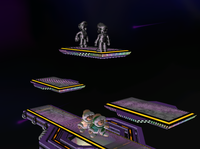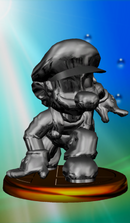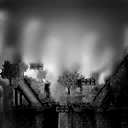Metal Mario: Difference between revisions
Smash x 5432 (talk | contribs) |
|||
| Line 26: | Line 26: | ||
===As a playable character=== | ===As a playable character=== | ||
When being controlled using codes such as the [[debug menu]], Metal Mario is ironically considered by many people as being worse than normal Mario; despite his aforementioned strengths in resisting knockback, he has reduced combo potential because he cannot efficiently use his down and up aerial attacks, due to an abysmal short hop, and has awkward aerial and dashing physics. As mentioned before, he also has extreme falling speed which not only hinders his [[recovery]], but makes him very vulnerable to [[chaingrab]]s and certain [[combo]]s. | When being controlled using codes such as the [[debug menu]],(with Game Shark and other hacking devices),Metal Mario is ironically considered by many people as being worse than normal Mario; despite his aforementioned strengths in resisting knockback, he has reduced combo potential because he cannot efficiently use his down and up aerial attacks, due to an abysmal short hop, and has awkward aerial and dashing physics. As mentioned before, he also has extreme falling speed which not only hinders his [[recovery]], but makes him very vulnerable to [[chaingrab]]s and certain [[combo]]s. | ||
{{clr}} | {{clr}} | ||
Revision as of 16:35, February 22, 2014
| Metal Mario | |
|---|---|
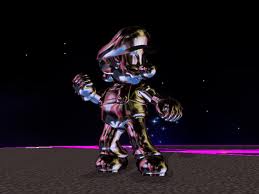
| |
| A boss in | Template:G Template:G |
| Universe | Mario |
| Console of origin | Nintendo 64 |
| Location | Meta Crystal |
| Article on Super Mario Wiki | Metal Mario |
Metal Mario is an metallic version of Mario who has appeared in Super Mario 64, two Mario Party games, a golf game, a tennis game, Dr. Mario 64 and Mario Kart 7, in addition to all three Super Smash Bros. games, mostly as a mini-boss.
In Super Smash Bros.
As a mini-boss
![]() Metal Mario appears in the 1P Game mode of this game as more or less a boss opponent to be battled one-on-one. Despite appearing to be just a simple palette-swap of Mario, he is a very different fighter; he barely flinches to ordinary attacks and is almost unaffected by throws at low percentages, and can sustain an absurd amount of damage before even being put into KO range (often over 300%). However, he is very weak to edge-guarding: once a player manages to knock him off the stage, he will often fail to recover due to his extremely fast falling speed, despite the decent distance that Super Jump Punch grants. Metal Mario never sprints and rarely jumps; he simply walks from place to place at a steady pace. Metal Mario also seldom uses his fireball even though a normal CPU Mario uses it often. On lower difficulties he mainly walks around the stage, seldom attacking, but he can be tougher on higher difficulties.
Metal Mario appears in the 1P Game mode of this game as more or less a boss opponent to be battled one-on-one. Despite appearing to be just a simple palette-swap of Mario, he is a very different fighter; he barely flinches to ordinary attacks and is almost unaffected by throws at low percentages, and can sustain an absurd amount of damage before even being put into KO range (often over 300%). However, he is very weak to edge-guarding: once a player manages to knock him off the stage, he will often fail to recover due to his extremely fast falling speed, despite the decent distance that Super Jump Punch grants. Metal Mario never sprints and rarely jumps; he simply walks from place to place at a steady pace. Metal Mario also seldom uses his fireball even though a normal CPU Mario uses it often. On lower difficulties he mainly walks around the stage, seldom attacking, but he can be tougher on higher difficulties.
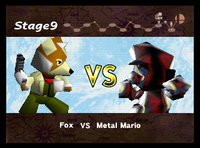
As a playable character
When being controlled using codes such as the debug menu,(with Game Shark and other hacking devices),Metal Mario is ironically considered by many people as being worse than normal Mario; despite his aforementioned strengths in resisting knockback, he has reduced combo potential because he cannot efficiently use his down and up aerial attacks, due to an abysmal short hop, and has awkward aerial and dashing physics. As mentioned before, he also has extreme falling speed which not only hinders his recovery, but makes him very vulnerable to chaingrabs and certain combos.
In Super Smash Bros. Melee
As a mini-boss
Metal Mario more or less reprises his role as a special opponent in the single-player Adventure Mode. He appears on the Battlefield stage after the player defeats the fifteen Fighting Wire Frames. Unlike the previous game, Metal Mario is not considered by the game to be a separate character, but rather regular Mario permanently under the effects of the new Metal Box item and with slightly faster falling speed than usual. He also does not resist knockback as much as in the original game. If the player has unlocked Luigi, Metal Mario teams up with Metal Luigi for that same battle, making it more difficult. Beating both characters will award the player with the Metal Bros. KO.
In addition to his appearance in the Adventure Mode, there is a chance that Metal Mario can appear as an enemy in the penultimate fight of the Classic Mode, which pits the player against a random metal character.
As a trophy
Metal Mario also appears as a trophy which can be acquired randomly through the 1-P mode or the Trophy lottery:
- Metal Mario
- Mario was in for a surprise the first time he hit a Metal Box in Super Mario 64. The metal cap that popped out transformed Mario into living metal, giving him great stamina, a heavy tread, and the ability to walk underwater. In Super Smash Bros., Metal Mario showed up as an incredibly stubborn midlevel boss.
- Super Mario 64
9/96
- Super Mario 64
In Super Smash Bros. Brawl
Despite his role as a boss in Smash 64 and Melee, he, alongside Race to the Finish, didn't return in Brawl. In Level 8 of Classic Mode the player will fight one of several combinations of Mario characters with random modifiers, but while "Metal Mario" is indeed one of the random possibilities, he is treated as a regular matchup. However, Mario can still become Metal Mario by using a Metal Box or battling in Metal Brawl.
Trivia
- If one looks closely at the reflection on Metal Mario's trophy in Melee, the Yoshi's Island stage can be seen. This is easiest to spot on his hat, nose or bottom.
- In Super Smash Bros., Metal Mario's series symbol is a bit different from the Mario series, making it more metallic.
- In Smash 64, when the Announcer introduces Metal Mario, his voice gains a slight change and becomes metallic. Although it may just be to place emphasis on the character's metal composition, the Announcer's voice sounds noticeably deeper and he does not change like that for announcing any other character in Classic Mode.
